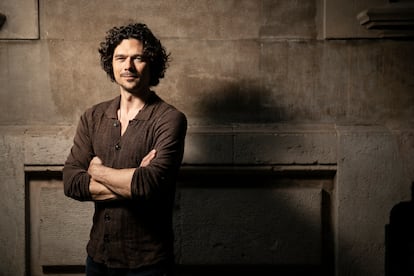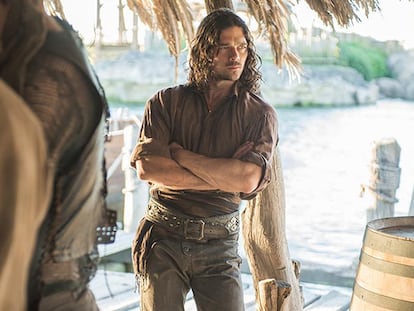Luke Arnold, actor: ‘Captain Jack Sparrow and Long John Silver would have got along fine’
The star of the ‘Black Sails’ pirate series is also the author of the popular ‘Sunder City’ fantasy novels


It’s a thrill to be alongside the actor who has starred in a series that has gripped you in front of the screen for so many hours. Luke Arnold (Norwood, Adelaide, 39) is not only a handsome, likeable Australian but also a successful writer. However, when you look at him and search his striking steel blue eyes, you glimpse large sails out at sea, old galleons and the Jolly Roger, the pirate flag, flying menacingly at the top of a mast.
Arnold, who sports an earring in his left ear and has the same beard and curly hair from the series, played a youthful and ruggedly handsome Long John Silver in Black Sails (four seasons, 2014-2017), the wonderful prequel —twenty years earlier — to Robert Louis Stevenson’s Treasure Island. The series depicted the Golden Age of piracy and revolved around Captain Flint and Long John Silver, with appearances by other famous buccaneers like Blackbeard, Jack Rackham, Charles Vane, and Anne Boney. The actor is also the author of a series of hugely popular fantasy novels (the Sunder City and Fetch Philips novels, published by Gamon, which begins with The Last Smile in Sunder City) about a world inhabited by humans and mythical beings that have lost their magic. This certainly hasn’t happened to Arnold. The interview, of course, takes place at the Gigamesh bookstore in Barcelona.
Question. This idea of yours of a world where magic has vanished and fairies, elves, wizards, gnomes, centaurs, mermaids, angels and vampires languish and wither is so compelling.
Answer. I don’t know where it came from, but it’s a metaphor for our environment where illusion has been abandoned and cynicism is the rule.
Q. The loss of magic as a force that drives the world and the need to look for alternative sources also evokes our energy crisis.
A. Absolutely, we’re running out of resources and inaction makes us complicit. There is so much at stake and we have to roll up our sleeves.
Q. It’s a great idea to mix fantasy and crime novels, a Raymond Chandler-style detective in a magical Tolkienian setting.
A. I like the imagery of the seasoned and disillusioned researcher, and if you combine it with things like angels, witches, gnomes or unicorns. But I’m not the first person to create these mixtures, Terry Pratchett certainly was.
Q. And Tim Powers, who incidentally also wrote On Stranger Shores, a novel that blended magic and pirates. The fourth part of Pirates of the Caribbean, the one with the mermaids, was partly inspired by it.
A. That gave it that special touch.
Q. Do you have a strong interest in pirates?
A. Oh, yeah. I find what they represent so appealing, not the wooden leg and the rum, but their wider concept of freedom. I’m not someone who places a lot of value on dates and historical concepts, but I love the evocations. Black Sails really grasped the evocative power of pirates and the idea that they were exiles from society and took that concept to another level.
Q. What was it like playing Long John Silver in the series?
A. It was an honor to be involved in Black Sails and it was very exciting to play the role. I was very conscious of the expectations that the character brought along. I had read Treasure Island before and seen all the film and television adaptations. Long John Silver, who is closer in age to Stevenson’s Jim in the series, is a tragic character with a certain poignancy, far more complex than a conventional pirate. And that is portrayed in Black Sails.
Q. What would Captain Jack Sparrow think of Long John Silver?
A. They’d probably get along fine, they’d make a good team. They’re both great manipulators. They’re not the toughest pirates, but instead, they use their imagination pretty well. And they both operate in a gray area of morality. Villains who can be charming.

Q. What was the filming like?
A. A dream, the scripts were fabulous, and they gave you all the toys; boats, swords, costumes. We spent four years filming in Cape Town, we all got deeply involved and enjoyed it immensely. What I liked most were the long scenes, with a lot of dialogue, especially with Flint, it was like a dance between two men.
Q. Without giving spoilers, there is a moment of revelation of Flint’s past that is rather startling.
A. Toby Stephens, the actor who played him, was the only one who knew that. We were all shocked. That was when we saw that the series was going to be so different from what was expected, it was very bold.
Q. Do you miss the sea and pirates?
A. Now I’m going to be doing Nautilus, a prequel to 20,000 Leagues Under the Sea, for Disney.
Q. Really? Could it be Ned Land?
A. No, nor Captain Nemo. I’ll be a soldier in pursuit of him. And I will also be involved in a thriller. And I’m still writing, I really like the novel series.
Q. Did you have to learn a lot of swordplay to play a pirate?
A. I was actually the one who had the most experience with the sword. I studied theatrical fencing and my first job was as a fight choreographer in an adaptation of Peter Pan.
Q. A foresight.
A. Haha, yeah. I also played Romeo, who has to fight.
Q. Better suited for Mercutio’s fencing.
A. Right. And Hamlet, but maybe I’ve missed the boat for this one, for the prince. The Shakespearean character I’d like to play most of all is Henry V.
Sign up for our weekly newsletter to get more English-language news coverage from EL PAÍS USA Edition
Tu suscripción se está usando en otro dispositivo
¿Quieres añadir otro usuario a tu suscripción?
Si continúas leyendo en este dispositivo, no se podrá leer en el otro.
FlechaTu suscripción se está usando en otro dispositivo y solo puedes acceder a EL PAÍS desde un dispositivo a la vez.
Si quieres compartir tu cuenta, cambia tu suscripción a la modalidad Premium, así podrás añadir otro usuario. Cada uno accederá con su propia cuenta de email, lo que os permitirá personalizar vuestra experiencia en EL PAÍS.
¿Tienes una suscripción de empresa? Accede aquí para contratar más cuentas.
En el caso de no saber quién está usando tu cuenta, te recomendamos cambiar tu contraseña aquí.
Si decides continuar compartiendo tu cuenta, este mensaje se mostrará en tu dispositivo y en el de la otra persona que está usando tu cuenta de forma indefinida, afectando a tu experiencia de lectura. Puedes consultar aquí los términos y condiciones de la suscripción digital.








































